Migrants coming to the US have overwhelmed cities, including Chicago, New York and El Paso
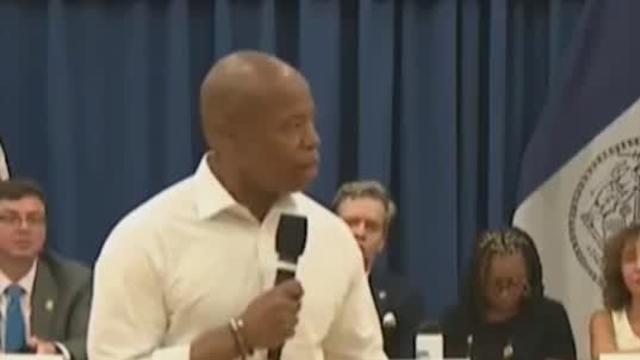
Each time Matt Wos passes his local police station near downtown Chicago, he can't believe seeing the dozens of migrants surrounding it seeking shelter.
Wos takes in the rows of people sleeping on the floors inside, a young mother placing her infant inside a crib outside, the migrants lining up the street in the nation's third-largest city, and he wonders: How long can this go on, especially as the weather starts to get colder?
"I'm all about us being a welcoming city and such. ... This makes me think how bad it can be for them in Venezuela or wherever they come from to come here," said Wos, a longtime accountant. "But it also looks like what we're currently doing to help them doesn't seem to be working."
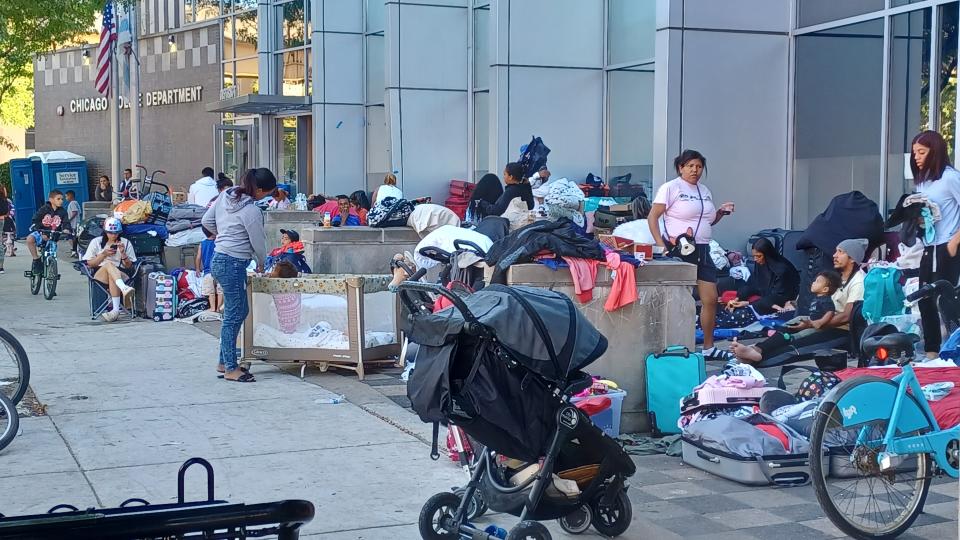
Halfway across the country in San Diego, County Supervisor Jim Desmond said about 4,800 migrants have been dropped off there in the past week. The migrant surge has led to the Border Patrol suspending pedestrian crossing at a facility in San Ysidro, California, so local authorities can assist, he said.
"It's inhumane ? it's not fair to those arriving here and to those who live in neighborhoods nearby," said Desmond, a Republican. "This is a broken and failed system by the federal government."
Meanwhile, anti-migrant activists in Chicago, New York and Massachusetts have gathered in recent weeks to protest against more migrants arriving and needing help in their communities.
From Staten Island to Chicago to San Diego and other points in between, some Americans are getting frustrated with migrants arriving in their neighborhoods with few shelter and assistance options for them. Many said they want the federal government and local officials to do more to provide help to those who need it and find a better solution for migrants hoping to enter the U.S.
The concern has been building, with the U.S. seeing high levels of illegal crossings in recent years after the COVID-19 pandemic kept many migrants from entering the country in 2020. The latest wave of migrants means more people arriving in cities across the U.S., looking for a place to sleep at bus stops, outside airports and in city halls.
"It's wildly frustrating," said Chicago Alderman Raymond Lopez, noting that Chicago has received more than 13,000 asylum-seekers, and counting, since August 2022. "There seems to be no end in sight."
Some local officials want Biden administration to do more
In New York City, Mayor Eric Adams has said the influx of migrants since 2022, more than 110,000 and counting arriving from the U.S.-Mexico border, will "destroy" his city. With more than 60,000 migrants still in the city's care, according to the Department of Social Services, Adams blames a lack of federal aid and Republican Govs. Greg Abbott in Texas and Ron DeSantis in Florida, who's also a GOP presidential candidate, for sending asylum-seekers to Northern states in recent months and causing a crisis.
"We're getting no support on this national crisis," said Adams, a Democrat, during a town hall.
Other city officials have said shelters and other resources are at capacity, and many new arrivals are forced to sleep on the streets. Many blame the Biden administration for not taking a stronger approach to U.S. immigration policy.
"It's not just New York going through this," Desmond said. "It's chaos the way the federal government is just dropping off thousands of people in this county that is getting no coordinated help or aid.
"This is not just a Democrat issue, not just a Republican issue," Desmond said. "This is a national issue."
Lopez, the Chicago alderman, a Democrat, also wants to see fewer migrants arriving in his community. "Every week, the city of Chicago sees new arrivals by bus or by plane. It's a slow and steady march with no real action from Washington," Lopez said.
Biden administration sends hundreds of troops to border
The Biden administration said on Sept. 19 that it would send 800 active-duty military personnel to help the 2,500 National Guard members deployed to assist Border Patrol agents at the U.S.-Mexico border.
The following day, the Department of Homeland Security said it would grant Temporary Protected Status to an estimated 472,000 Venezuelans in the U.S. as of July 31 to help ease a path to work authorization. That move is in addition to nearly 243,000 Venezuelans already qualified for the temporary status.
In an emailed statement, a White House spokesperson said Biden has called on Congress to pass comprehensive immigration reform.
"Without Congressional action, this Administration has been working to build a safe, orderly, and humane immigration system and we’ve led the largest expansion of lawful pathways for immigration in decades," the statement said. "The federal government is working to provide information and services to ensure that those who are eligible submit their work permit applications immediately."
But that may provide little help immediately for Eagle Pass, Texas, where Mayor Rolando Salinas said about 2,000 migrants had crossed the border on Sept. 21 after officials shut down one of the city's two international bridges to reroute agents elsewhere. About 9,000 asylum-seekers have crossed from Mexico in the past week.
The bridge shutdown in Eagle Pass came after the city declared an emergency declaration on Sept. 19 because of a "severe undocumented immigrant surge." The mayor said the order was issued to give the town "the ability to request financial resources to provide the additional services caused by the influx of the undocumented immigrants," Salinas said in a news release.
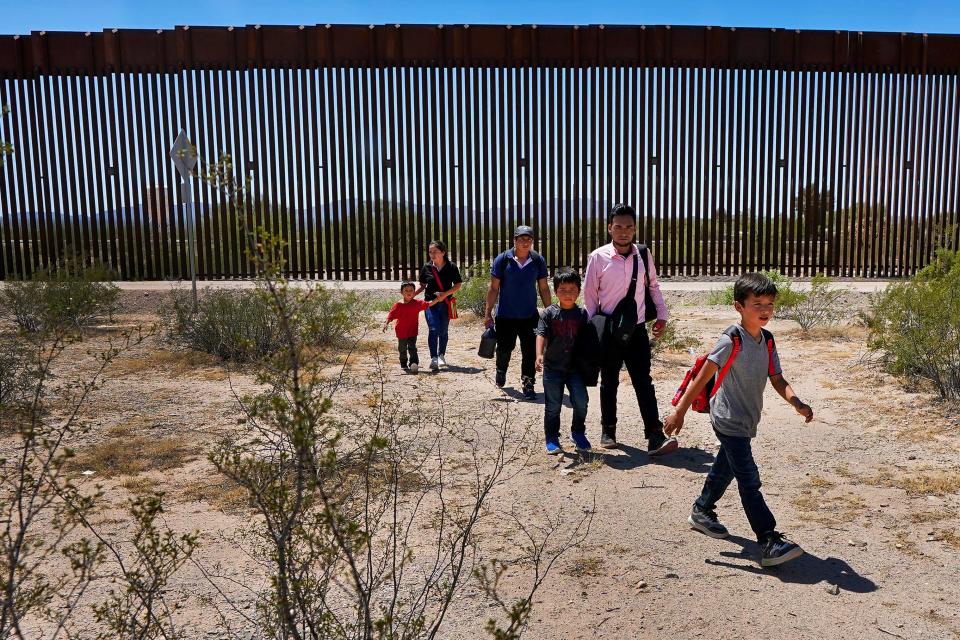
The next day, Abbott, the Texas governor, declared an "invasion" at the state’s border with Mexico.
Salinas said he fears more large migrant groups were going to arrive over the weekend. On Sept. 21, the Eagle Pass mayor told CNN that Biden should take some blame for the surge of migrants into his town.
"I will be honest with you. I believe 100% he does bear some responsibility for this crisis," Salinas said. "I haven’t heard from anybody in the administration. The president hasn’t put out a statement, the vice president, I haven’t heard from anybody."
Migrants are fleeing poverty and violence
Meanwhile in El Paso, Texas, about seven hours to the east of Eagle Pass, the city is entering its "fourth wave" of migrant surges since 2018, according to Laura Cruz-Acosta, an El Paso city spokeswoman.
The city has received more than 1,800 migrants a day crossing the border in the past week, the first major surge since the expiration in May of Title 42, a COVID-19 pandemic policy that allowed the U.S. to cite fears of spreading the virus as a reason to expel migrants.
"It's putting a strain on our city," Acosta-Cruz said. "It is concerning that we're seeing this ramp up very quickly."
El Paso Mayor Oscar Leeser told reporters Saturday that "we have come to what we look at (as) a breaking point right now."
Acosta-Cruz said what's occurring in El Paso mirrors a surge in other border cities. Arrests at the U.S.-Mexico border increased in July and August after an initial sharp decline in May and June after the Biden administration launched a new policy requiring migrants heading to the U.S. border to first seek protection in Mexico. Biden adopted the rule after Title 42's expiration.
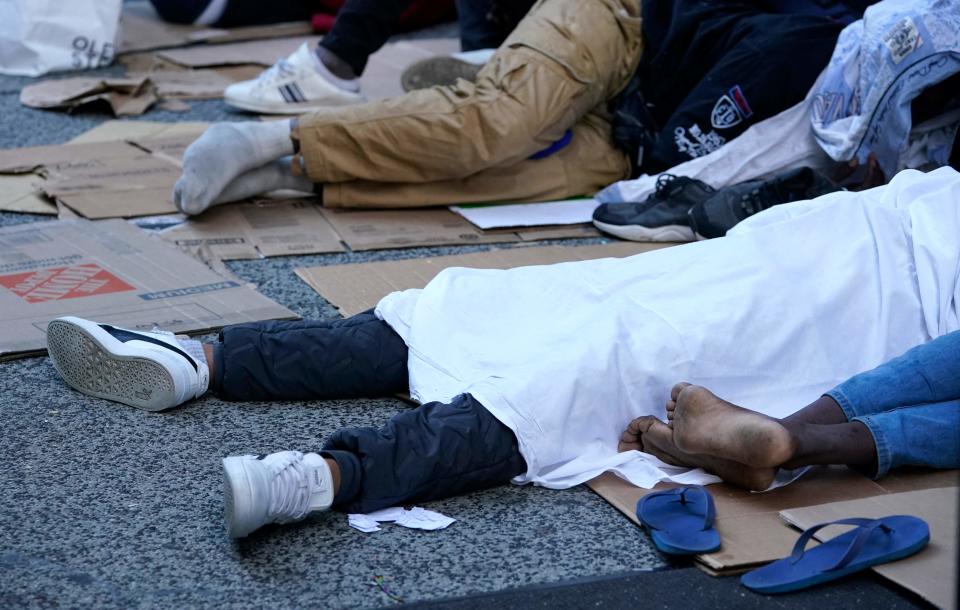
But many migrants, many arriving from Venezuela, aren't waiting for various reasons. "The type of migrant we see now are those who are leaving their communities they call home for humanitarian reasons, because of violence, poverty, political reasons economic and to try escaping human trafficking," Acosta-Cruz said.
Border Patrol Chief Jason Owens told ABC News in an interview that aired Sunday the Mexican drug cartels are flooding the U.S. border with illegal immigrants in part as a distraction so they can smuggle drugs, criminals and weapons into the country.
"In terms of flow and the threats that we’re seeing with fentanyl and with the criminal organizations that are our adversary, it’s about as bad as I’ve ever seen it," Owens said. "This isn’t sustainable. This is up-and-down the system, everybody is overwhelmed. Even the government of Mexico, which have been great partners for us, the U.S. Border Patrol, a lot of times our facilities are already over capacity."
On Sept. 21, Mexican officials pledged to set up checkpoints to "depressurize" migrants from hopping freight trains from its northern cities which border El Paso, San Diego and Eagle Pass.
Acosta-Cruz, the El Paso city official, adds from what she has seen, a lot of migrants are being "misled by the cartels so really it's a lot of misinformation being shared with the migrants. They have this understanding they can just come in and flow through, but that's not the case."
About 1,000 migrants are housed in nine hotels around town, and there is a recreation center ready to use, Acosta-Cruz said. Because El Paso handles its fair share of migrants, some of whom stay anywhere from 24- to 72 hours before moving on, the city and El Paso County receive Federal Emergency Management Agency funding and work collaboratively with nonprofits, churches and other local businesses to handle matters.
"The discussion that's happening nationally does not really paint a comprehensive picture of our city and how we are addressing it," Acosta-Cruz said. "Our approach is very humane we are working as best as we can to address a terrible national crisis and meeting the needs of our community."
'They have allowed the border crisis to become our backyard crisis'
The migrant crisis in Chicago, however, continues to be a hotly contested matter, as evidenced during a tense City Council meeting Sept. 14.
While a majority of the council overwhelmingly approved accepting a $33 million grant from FEMA to be used for migrant spending, Lopez and three other aldermen voted against it, citing homeless and low-income residents in their wards cannot find affordable housing.
"We're hearing more and more, 'What are we doing for our Chicago residents as we are doing for our new arrivals?'" Lopez said. "'What about us?'"
In June, Lopez wrote an open letter to President Joe Biden, encouraging him to tour overrun migrant camps in the city. Lopez wrote that tens of thousands of migrants "have flooded our borders and been shipped like livestock across the country," and spread beyond the border towns and villages to cities like Chicago.
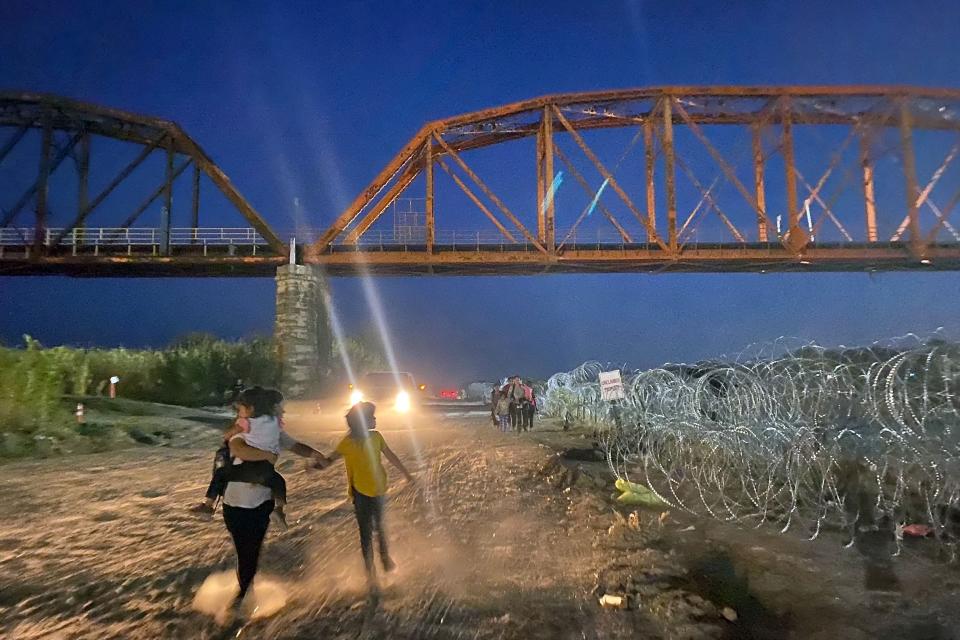
The alderman said it's simply unreasonable to expect cities and states to either directly or indirectly provide for migrants' welfare. Lopez urged Biden to visit a field house in a city park where summer camps were suspended to accommodate about 300 migrants for about three months.
"They have allowed the border crisis to become our backyard crisis," Lopez said. "I might not be towing the party line, but I'm towing the truth, those who believe in values truly believe what I am saying."
Kate Marengo, a fellow Chicagoan and small business owner, also wants the federal government to help find a solution to the many migrants arriving in Chicago.
"If they secured the border properly, none of this would be happening," Marengo said. "There are Americans who are really struggling. We have to secure our oxygen masks first before we help others and America is bleeding right now."
Wos, the Chicago resident, is hopeful things will get better. Recently elected Mayor Brandon Johnson has promised to place migrants sheltering at police stations in heated camps as they wait for spots in city-run shelters.
"I take them at their word that there will be heated tents, but all of my friends think 'Is that going to be enough when it gets cold and with more migrants coming?'" Wos said. "I don't think there is an easy answer to dealing with this issue. We need to do more at the border."
This article originally appeared on USA TODAY: Migrants coming to US need housing, food. Cities worry about strain
Solve the daily Crossword

